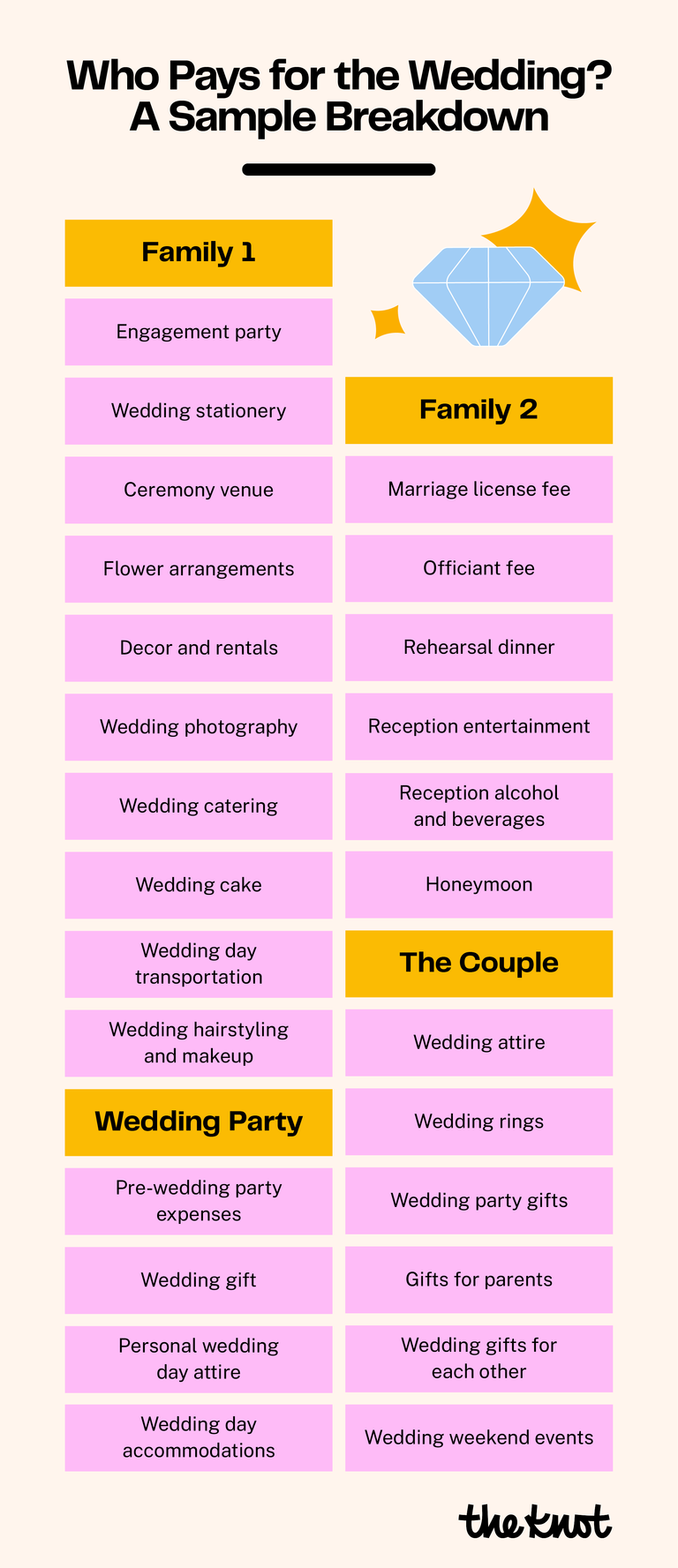Weddings can be expensive affairs. With venues, flowers, food, drinks, attire, and other elements all adding up, it’s common for couples to spend over $30,000 on their big day. This leads many brides and grooms to wonder: who is supposed to pay for the wedding?
Traditionally, the bride’s family pays for most wedding expenses. However, with changing social norms and couples getting married later in life, more costs are often shared between families or paid for by the couple themselves. Regardless of who pays, it’s important for couples to communicate expectations early and budget accordingly.
The Tradition: Bride’s Family Covers Most Costs
Up until the past few decades, tradition dictated that the bride’s family pays for the wedding. This traces back hundreds of years when daughters were seen as burdens on their families. The wedding was considered “giving away” the bride to join the groom’s family. As compensation, the bride’s family covered wedding costs.
Over time, the bride’s parents came to pay for:
- Venue
- Catering
- Wedding cake
- Decorations
- Music/entertainment
- Wedding favors for guests
- Wedding invitations
- Transportation on the wedding day
- Flowers
- Photography
Meanwhile, the groom’s family traditionally pays for:
- Wedding rings
- Marriage license
- Officiant fees
- Bride’s bouquet and ceremonial arrangements
- Boutonnieres and corsages
- Honeymoon expenses
- Rehearsal dinner
The Reality: Costs Are Increasingly Shared
While this tradition provides an outline, many modern couples split wedding costs more evenly. Several factors drive this:
Couples Paying for Themselves
With couples increasingly footing their own wedding bills, it’s less common for one family to cover everything. Many couples cover some or all costs themselves, especially if they’ve been independent for awhile. Partial or full self-funding allows couples to pay for their perfect wedding vision.
Families Offer What They Can
Some parents cannot afford the full traditional wedding price tag. Instead of straining finances, many families contribute what fits their budgets. The couple may cover any remaining costs.
More Equality Between Families
Rather than placing the full financial burden on the bride’s family, many grooms’ families take on more costs. Some expenses like the rehearsal dinner are still covered by the groom’s parents. But other items like the wedding venue, food, or decorations are shared between both families.
Couples Marrying Later
With couples marrying later in life, often in their 30s versus early 20s, they are more likely to pay for the wedding themselves. After establishing careers and financial independence, some couples fully self-fund even large weddings.
How To Determine Who Pays
Despite changing norms, the old traditions still offer a starting point for wedding financial planning. From there, couples can adjust based on their situation. Here are some tips:
Discuss Finances Early
Before booking vendors and setting plans, couples should discuss wedding financial contributions. This gives time to budget, save money, and manage expectations.
Involve Parents
Parents contributing to the wedding should be involved in planning. Understanding parents’ budgets and priorities helps guide decisions.
Be Flexible
Rather than sticking to rigid rules about who pays for each element, keep an open mind. Seek creative solutions if parents cannot cover traditional costs.
Make Final Decisions Together
Regardless of who pays for what, couples should make all wedding decisions together. Compromise if certain choices stretch the budget.
Other Financial Considerations
Beyond direct wedding costs, couples should address a few other money matters:
Wedding Party Attire
Traditionally, bridesmaids/groomsmen cover their own attire costs. But some couples choose to pay, especially if requiring expensive formalwear.
Bachelorette/Bachelor Parties
Wedding parties traditionally host and pay for these events. However, some brides/grooms cover costs for invitees who cannot afford travel or activities.
Guest Accommodations
If having a destination wedding, couples sometimes cover hotel rooms for close family/friends. This helps make attending affordable.
While tradition states the bride’s family pays for most wedding expenses, many modern couples split costs or pay entirely themselves. Open communication and financial transparency helps smoothly determine who pays for what. By setting budgets and managing expectations early on, couples can craft their dream wedding while maintaining important relationships.



